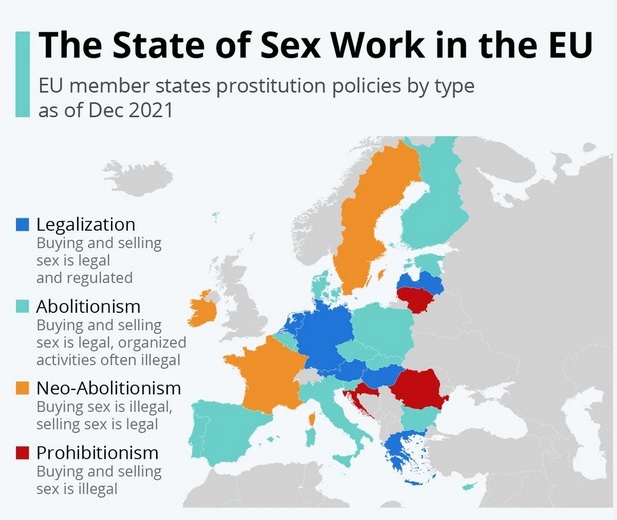In a recent development, EU lawmakers have found themselves at odds over the regulation of sex work, sparking debates on the proposed regulatory model, terminology, and the legitimacy of the industry as a whole.
The European Parliament is currently in the process of finalizing a report titled "Regulation of Prostitution in the EU." The report recommends the decriminalization of individuals engaged in sex work while criminalizing clients and third parties involved in organizing sex services, with the aim of reducing demand.
However, the draft report has led to divisions among EU lawmakers, particularly within the Committee on Women's Rights and Gender Equality (FEMM), who are responsible for overseeing the report. The primary point of contention revolves around the use of the term "prostitution" instead of "sex work" and the characterization of prostitution as a form of gender-based violence.
Maria Noichl, a social-democrat MEP, argues that prostitution should be considered a form of violence against women rather than a legitimate job. She believes that sex work is not a matter of free choice and contends that legalizing prostitution inadvertently enables human trafficking. Noichl emphasizes the need for a comprehensive policy that includes prevention, exit strategies, and societal reintegration, without criminalizing individuals engaged in prostitution.
On the other hand, MEP Karen Melchior from the Renew party highlights the importance of distinguishing between sex workers who engage in the profession voluntarily and those who are forced into it. While acknowledging that forced prostitution can be considered gender-based violence, Melchior asserts that consensual adult sex work should not be equated with violence. She criticizes the draft report's definition, which she believes complicates the discussion.
MEP Monika Vana of the Greens also opposes the report's approach, stating that if prostitution is labeled as gender-based violence, it should be prohibited. Vana is actively working to amend the report's language to address this concern.
Sabrina Sanchez, the director of the European Sex Workers Alliance, shares a similar viewpoint. She criticizes the proposed regulatory model, known as the "Nordic model," which advocates for the decriminalization of sex workers while criminalizing clients and those involved in organizing sex work. Sanchez argues that this approach fails to recognize the agency that sex workers could possess if their profession were decriminalized and recognized, allowing them to access labor rights. She points to the Belgian model as a preferable alternative, as Belgium is the only country in Europe where sex work is fully decriminalized.

Currently, sex work regulation across EU member states is inconsistent. In most countries, organizing sex work is illegal, while the industry remains unregulated, leading to untaxed earnings and a lack of social insurance or pension benefits for sex workers. The draft report suggests that adopting the Nordic model, similar to Sweden and Ireland, would reduce demand and combat the stigmatization of individuals engaged in prostitution, while ensuring access to exit strategies and social security systems.
However, activists caution that criminalizing clients may push sex workers to engage in riskier behaviors to avoid detection. Moreover, sex workers often fear being charged with brothel-keeping, which is illegal under the Nordic model. Additionally, many sex workers are migrants who avoid involving law enforcement due to concerns about their immigration status and potential impact on their chances of obtaining citizenship.
While MEPs remain divided on whether sex work should be considered a legitimate job, there is a consensus on the need to decriminalize sex workers to ensure their access to healthcare and social benefits. Some lawmakers emphasize the importance of addressing the root causes of prostitution, such as drug use, poverty, and coercion, while also targeting demand in both online and offline contexts.
However, not all lawmakers believe this is the appropriate time for such a divisive debate. MEP Monika Vana expresses concern about the timing of the debate, noting the deep divide within feminist communities across Europe. She worries that engaging in such a contentious discussion could have negative repercussions leading up to the European elections scheduled for next year.
Despite this concern, other MEPs, including Karen Melchior, argue that EU lawmakers should not shy away from the debate, regardless of its divisive nature. Melchior believes that it is essential to address the issue head-on, emphasizing the importance of adopting a human rights-based perspective in the report.
Maria Noichl acknowledges the difficulties inherent in the discussion, recognizing that finding a middle ground might be challenging. She anticipates that the final outcome will ultimately be determined by the voting result.
In conclusion, the European Parliament's report on the regulation of sex work has generated significant divisions among EU lawmakers. Disagreements persist regarding the terminology used, the characterization of sex work as violence against women, and the proposed regulatory model, particularly the Nordic model. While there is consensus on the need to decriminalize sex workers for improved access to healthcare and social benefits, finding common ground on the broader approach to regulating sex work remains a complex task.


